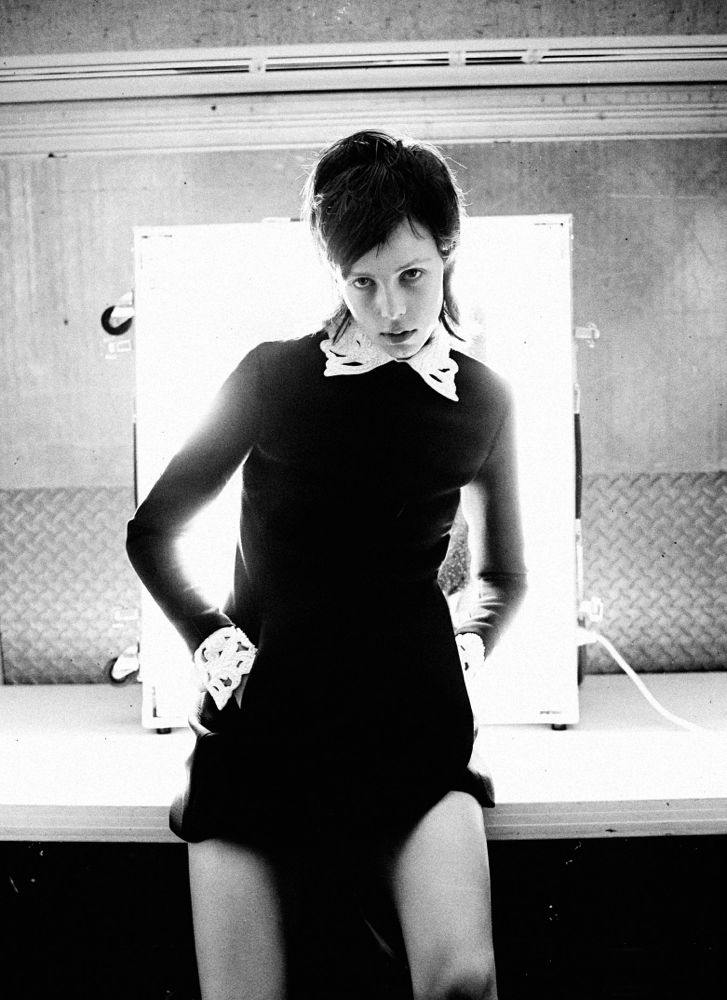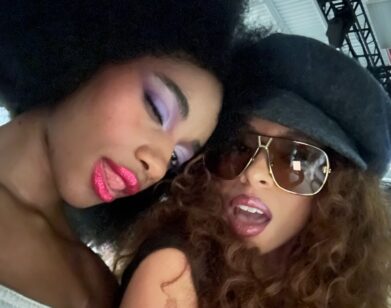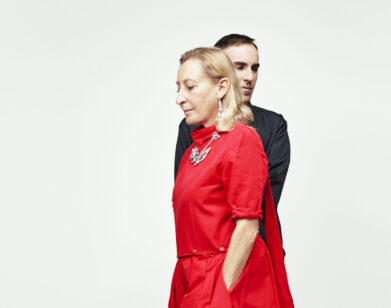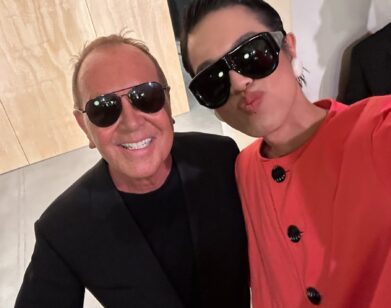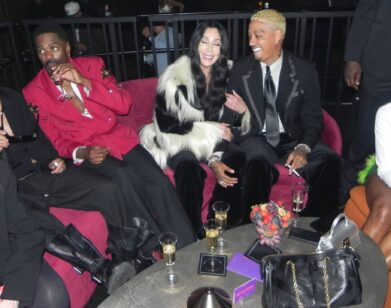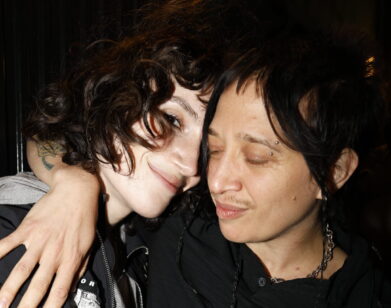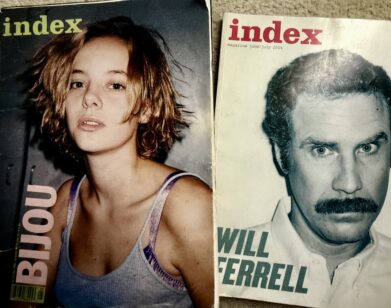The 21st Century Girl: Edie Campbell
I DON’T know HOW MUCH IT’S GOT to DO WITH ME and HOW MUCH IT’S got TO DO with GETTING A NEW HAIRCUT and MAKING PEOPLE LOOK at YOU as SOMEONE YOU can TRANSFORM. Edie Campbell
It could be the plot to one of those movies where a girl gets a makeover and suddenly becomes popular, except Edie Campbell was already pretty popular when she cut her waist-length blond tresses into a short, angular, raven-ish shag at Steven Meisel’s behest late last year. But the haircut—as well as three Vogue covers (one British, two Italian) and campaigns for houses like Marc Jacobs, Jil Sander, Lanvin, and Alexander McQueen, all within the last year—have catapulted the 22-year-old British-born Campbell to another level of fashion-world radness.
The daughter of former British Vogue-editor-turned-architect Sophie Hicks, Campbell graduated this past spring from the Courtauld Institute of Art in London with a degree in art history and was on a trip to Sri Lanka with her family when she took some time out to chat with her good friend, designer J.W. Anderson, who spoke with her from London.
J.W. ANDERSON: Where are you?
EDIE CAMPBELL: I’m in Sri Lanka on holiday.
ANDERSON: How long are you out there for?
CAMPBELL: Ten days.
ANDERSON: Is it very hot?
CAMPBELL: Roasting. Really hot.
ANDERSON: Well, I’ve never done this before so I’m going to crack on and see how we go. So why do you think designers and photographers are all responding so well to you at the moment?
CAMPBELL: Oh god, I don’t know. I don’t know how much it’s got to do with me and how much it’s got to do with getting a new haircut and making people look at you as someone you can transform. Before my hair was long and blond and wavy, with kind of a ’60s fringe. It’s quite limiting, what you can do with that.
ANDERSON: When did you cut your hair?
CAMPBELL: I got it cut for Steven Meisel, who wanted to cut it short and dye it black for the punk story that we did in American Vogue.
ANDERSON: Do you enjoy working with Steven?
CAMPBELL: He’s incredible because he’s quite inscrutable. He’s very measured in everything he does. And yet he has such range in the way he works. But he’s so not that Caravaggio figure. It’s really intriguing, actually, because he creates such feeling in his pictures, and yet he does it in a very measured way when you’re working with him. Where other photographers scream and shout, he sees things in incredible focus.
ANDERSON: If you weren’t modeling, what would you be doing?
CAMPBELL: I have no idea.
ANDERSON: What would you dream of doing?
CAMPBELL: I really don’t know. I’d like to work with horses but it doesn’t pay very well. Maybe I’d like to go somewhere in the Middle East because they keep buying really nice horses for their Olympic teams—like, the Qataris.
ANDERSON: What is your most important physical characteristic?
CAMPBELL: I have no idea.
ANDERSON: No idea?
CAMPBELL: In terms of making money, it would be my face. In terms of having a nice life, it would be my brain.
ANDERSON: When you got the haircut, what did your boyfriend think?
CAMPBELL: He was horrified for about three days, and then he was like, “Whatever.” But at first he was like, “Oh my god. You’ve come back to London with a mullet. What the fuck is this?” But then he had to go and work with me.
ANDERSON: When you looked in the mirror, did you feel that your character had slightly changed? Did it feel empowering?
CAMPBELL: I think I look more like me than I did before. It seems more of an accurate description of my character. I don’t think that whole kind of long, wavy, girl look was realistic. It was really liberating. I suppose it has changed the way I dress as well. It’s made me even scruffier than I already was. And I don’t really like the idea of short hair and puffy dresses, because I think it makes you look like Miss Piggy. So that was quite nice, because I’d always felt a bit twee in little dresses. It freed me of the burden of ever seeing myself like that again. And also what was great was that it meant that people couldn’t dress me up as a ’60s girl on shoots anymore—which is great—because no one in the ’60s had a mullet.
ANDERSON: Is there anything that you’ve learned from horse riding that applies to your everyday life?
CAMPBELL: It’s very good for you, riding. You know how every model is like, “I do yoga.” Well, I find horses have the same effect, in that you have to put your ego aside and concentrate on making the horse do the things you want it to do, and move in the way you want it to move—particularly if you’re doing dressage. So you have to use your body to help this horse do incredibly difficult movements that don’t come naturally to it. And if something goes wrong, it’s not the horse’s fault; it’s always your fault. So you have to be quite levelheaded. And then the whole nature aspect of it is very calming. It’s great. No one in the horse world gives a flying fuck what they look like.
ANDERSON: Do you get to do much riding now?
CAMPBELL: Yeah, I try to ride. At the moment, my horse is off sick, so I haven’t ridden for a little bit. But I try to ride as much as I possibly can.
ANDERSON: What are your horses’ names?
CAMPBELL: Their names are Dolly and Armani. I didn’t name them myself, obviously. I wasn’t like, “Oh, my god, what am I going to call my horse? I know—Armani!” I think the seller who sold me Armani was like, “Oh, she’s a model. Let’s tell her it’s called Armani so she’ll want to buy it.”
ANDERSON: In terms of English models, would you perceive them to be more carefree, in regard to looks, than, say, American models?
CAMPBELL: I think they can be more carefree. There’s a thing in the U.K., particularly in London, where it’s kind of the idea of subculture and counterculture and the outside and the idea that it’s great to be a freak and the freak always wins. So I think English girls are a lot less scared of being the freak or looking like an idiot. To be the outsider is actually a great thing in England. I don’t know—I’m not American. But I think the majority of American teenagers don’t want to be the freak.
ANDERSON: They want to be more controlled.
CAMPBELL: Yeah, exactly. I actually think what’s great about growing up in London is that you see so many different freaks, and they all look at each other like they’re freaks and go, “God, what a freak! Whatever … I don’t care.” It doesn’t mean a thing to them. You kind of feel this nonchalance about it.
ANDERSON: Are there any models that you really respect and admire?
CAMPBELL: Well, I think Stella Tennant is amazing. And then I really loved all those ’60s society models, like Edie Sedgwick.
ANDERSON: Did you find it difficult to manage your work life with exams and school and do the whole balancing act?
CAMPBELL: That was quite difficult, but it’s done now, thank god. I didn’t realize how exhausting it was until suddenly I had one less responsibility I could check off my list. My agents would call up and be like, “I’ve got this really great job and they want you to do it. Can you be free for a day a week before your exams?” And the week before your exams is when you’re really shitting your pants thinking, “I’m never going to get this done … If I take a day off, will I then get terrible grades? Or will it matter anyway?” So it was quite stressful trying to work out how much I could work and how much I should study in order to balance it all in a way that’s fruitful. So, yeah, it was quite difficult. But it was nice to work through university. Otherwise, I think you can become so fixated on the idea of studying and exams and you become quite institutionalized.
ANDERSON: Do you ever see yourself going from modeling into, say, acting?
CAMPBELL: I don’t know. I kind of shy away from that idea because it seems to me to be such a cliché. Also, if you want to be a serious actress, then it’s quite difficult to make that transition without being the blond bimbo in the opening credits. Maybe I’m being idealistic about acting and the idea that they would hire people purely based on their talent and not on their looks. But I don’t know if I would be a very talented actress anyway. When there were school plays, I would always refuse to be in them. I just did the lights and stuff.
ANDERSON: If you became an actress, you could do a period drama, because they often involve horses.
CAMPBELL: A period drama could be quite good, but I don’t like when there’s quivering bosoms in corsets. So it’d have to take place either a very long time ago or in a period when you didn’t have to have quivering bosoms to be historically accurate.
ANDERSON: Maybe it’s a British thing, but do you ever say, “How long will this last?” or “If this all stopped, would that be fine?”
CAMPBELL: Totally. I’m quite cynical as well, especially doing this, which works on such a short cycle in. It’s going to be someone else next season or 10 seasons from now. My time for the last 22 years has been divided up in terms of a school year, summer, holidays, and now it’s divided up in terms of seasons, which I think is hilarious. But there is definitely a cynical part of me that thinks this is all going to end, so enjoy it while it lasts, which is great because it gives you a kick up your ass to do a good job.
J.W. ANDERSON IS A LONDON-BASED DESIGNER.

